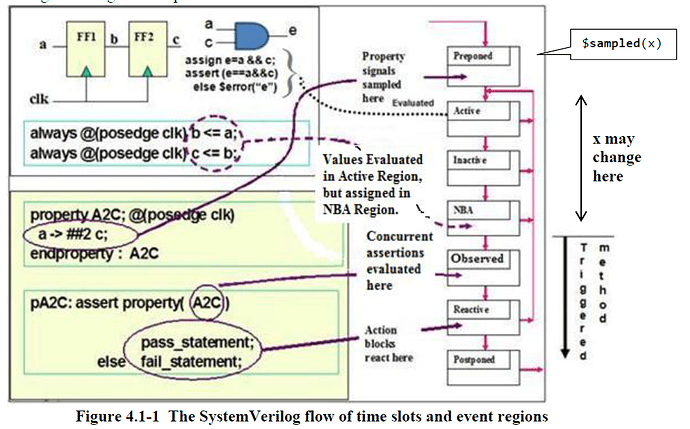In reply to Bhaskar44:
I am writing an assertion to check the value of a signal from the DUT against a value I calculated in my assertions module.
On the waveform I see that both the signals do have similar values.
My problem is that the assertions aren’t even triggering!
The code that I have is :
cmd_10_chk: assert property (@(negedge act_vfy)
(1) |-> (enc_sva[8] == enc_dut_8[3:0]))
else $error ("Error: encode failed for SVA, %d != %d", enc_sva[8], enc_dut_8 );
act_vfy is a flag, upon its negedge is when the assertion should trigger!
Similarly I have 16 assertions each to check for 16 values from the DUT which arrives as different signals.
[Ben] Your issue seems to be the sampling regions and when the signals are sampled.
From your description, I believe that you are using something like the following code:
always_ff @(posedge clk)
if(some_condition) act_vfy <= 1'b0;
else act_vfy <= 1'b1;
// act_vfy changes in the NBA region, see below for regions
always_ff @(posedge clk)
if(some_situation) enc_sva <= some_value;
// BAD STYLE because of triggering and sampling regions
// ****
cmd_10_chk_VERY_BAD_STYLE: assert property (@(negedge act_vfy)(1) |->
(enc_sva[8] == enc_dut_8[3:0]) );
// The sampling value for enc_sva[8] is one delta time (i.e., just before)
// act_vfy is falling (i.e., when it was ==1'b1.
// I believe that what you want to express is that
// * When act_vfy went to a zero, then after enc_sva[8] settles,
// (enc_sva[8] == enc_dut_8[3:0])
// Your correct should should then look like this:
always_ff @(posedge clk)
if(some_condition) act_vfy <= 1'b0;
else act_vfy <= 1'b1;
always_ff @(posedge clk)
if(some_situation) enc_sva <= some_value;
// *****************************************
cmd_10_chk_better: assert property (@(posedge clk) $fell(act_vfy) |->
(enc_sva[8] == enc_dut_8[3:0]))
else $error ("Error: encode failed for SVA, %d != %d", enc_sva[8], enc_dut_8 );
// *****************************************
// On a separate note, properties of the type
1'b1 |-> consequent // can be reduced to:
consequent // The 1'b1 antecedent is not needed.
// Similarly I have 16 assertions each to check for 16 values
// from the DUT which arrives as different signals.
// [Ben] Consider using the generate statement if it fits your needs.
// Below is an example of a generate statement, from my SVA Handbook 4th Edition, 2016
generate for (genvar g_i=0; (g_i<8); g_i++) begin
if (g_i >= N)
ap_range_gen: assert property (v==g_i && $rose(a) |-> ##[N:g_i] b);
end endgenerate
Ben Cohen
http://www.systemverilog.us/ ben@systemverilog.us
- SVA Handbook 4th Edition, 2016 ISBN 978-1518681448
- A Pragmatic Approach to VMM Adoption 2006 ISBN 0-9705394-9-5
- Using PSL/SUGAR for Formal and Dynamic Verification 2nd Edition, 2004, ISBN 0-9705394-6-0
- Real Chip Design and Verification Using Verilog and VHDL, 2002 isbn 978-1539769712
- Component Design by Example ", 2001 ISBN 0-9705394-0-1
- VHDL Coding Styles and Methodologies, 2nd Edition, 1999 ISBN 0-7923-8474-1
- VHDL Answers to Frequently Asked Questions, 2nd Edition ISBN 0-7923-8115
